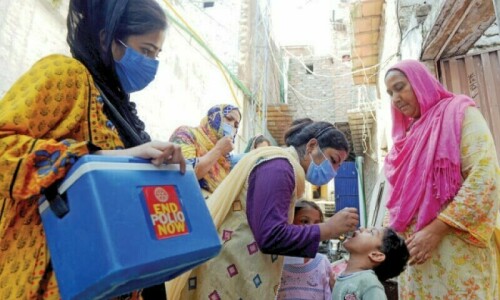Pakistan is expanding rapidly. But not the kind you want. By mid-October, the country had 33 cases of polio, up from eight at the end of June. Even though a lot has been written about it this year, the consistent rise in cases points to a deeper problem: healthcare failures across the board
While it is true that the government faces obstacles like disinformation, parental refusal, and attacks on polio workers, it is time to realize that our children are also being harmed by a lack of healthcare infrastructure and bad governance.
Children are susceptible not only to polio but also to a variety of diseases that can be avoided in places like Balochistan, Pakistan, where immunization coverage is as low as 37 percent. There are still a lot of RHCs that don’t work or don’t have enough money, so a lot of people don’t have basic health care. As a result, vaccination campaigns, however well-intentioned, are only temporary solutions to a problem when the real problem is long-term disregard for public health services.
This is exacerbated by reports of false vaccination data and number-fudging. While the public authority asserts high inclusion, natural examples keep on testing positive for the infection, particularly in high-risk regions like Quetta. Trust has been damaged as a result of this gap between official figures and the actual situation.
It is impossible to address the polio epidemic on its own. Pakistan must reconsider how it provides healthcare. Rather than regarding polio as an independent crisis, it ought to be integrated into a more extensive general wellbeing procedure. For instance, polio workers might be trained to promote other health measures like sanitation, nutrition, and the health of mothers. This would strengthen the healthcare system as a whole and aid in the fight against polio.
The public authority’s job can’t be put into words. Especially in rural areas, it needs to give the improvement of basic healthcare infrastructure top priority. In order to protect children from diseases like polio and restore public confidence in immunization efforts, functioning health centers, routine vaccination, and trained staff are essential.
Reporting transparency is just as important. For alleged data falsification, local officials should be held accountable, and regular audits must be carried out to ensure that every child is vaccinated. Health care workers need better protection from obscurantist forces that want to ensure that anti-polio campaigns fail, and the government must acknowledge this.
Simultaneously, people group should assume liability. Since public health is everyone’s responsibility, no vaccination campaign will be successful without everyone’s help. It will be necessary for parents to realize that giving their children routine polio vaccines is the only way to prevent this life-threatening condition. Since it is a particularly common issue, the public authority might consider boosting guardians for getting their kids vaccinated.
The lack of vaccination is not the only cause of Pakistan’s polio crisis. It is the failure to fulfill fundamental promises regarding public health.



